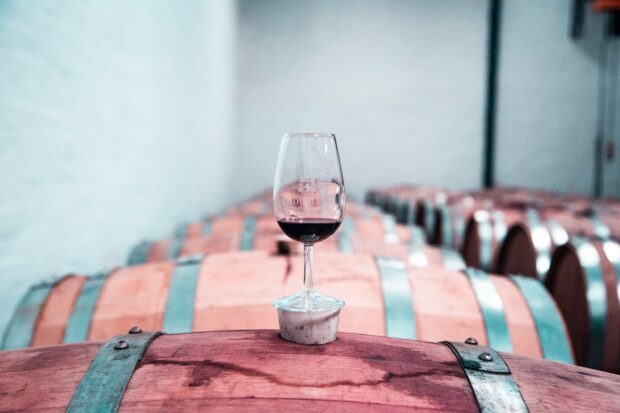A vegan diet only includes a diet based purely on plants like vegetables, fruits, and nuts. Vegans never consume foods that have animals, fish, or any other dairy products, including eggs.
Vineries make red wine the same way they used to make it thousands of years ago. The grapes with dark-colored skin get harvested, crushed, and then fermented. The pneumatic press separates the skins of the grapes.
Wine is the product of grapes. Grapes crushed are kept idle for fermentation, and finally, the Vines having alcohol are made. After fermentation, different fining agents are added to remove that bitter taste.
Is Red Wine Vegan?

Red wine is made from harvested grapes, so at first glance, it is okay to assume that a bottle of red wine is a vegan drink.
Only vines not put through the fining process should be considered a vegan diet. Even unfiltered wines could also be considered. The government has yet to implement any legal rule instructing vine producers to specify on their labels that their product contains animal products.
Few drinks are only suitable for vegan persons. If the words vegan red wine is printed and displayed on the labels of wine bottles, only these are vegan drinks. Vegans should be careful while drinking any other labeled wines as they may contain animal products.
The Fermentation Process Of Red Wine Making
During the fermenting process of Wine-making, yeast is added to grapes, as this converts the sugar found in grapes into alcohol and carbon dioxide.
Fermentation makes the wine cloudy, and molecules like phenolics are found floating. It is the key to making Wine, but it can give it a hazy or cloudy appearance. After a Wine has been fermented, it can have molecules like phenolics and tannins floating around.
Phenolics affect the taste of red wine. It is a preservative, and the color of the red wine is caused by it. At the same time, tannins get extracted from the grape’s skins, seeds, stems, and the oak barrels where the Wine is stored.
Even though these molecules are natural, many prefer drinking more apparent wine. Hence many wineries sell precise crystal clear wines. To get this, it has to be put through the fining process.
Using Animal Products To Achieve A Clear And Fresh Product

In the fining process, animal products are added as agents to filter them and make them fresh. It also helps remove unwanted aromas and flavors caused by sedimentation when the wine is stored in barrels. Though red wine is entirely produced from fruits, sometimes the procedures used in making it might vary. And the final product will become unsuitable for vegan people as it may contain animal products.
Animal products usually include fish oil, blood, bone marrow, milk proteins, and egg whites. Even though these agents are removed after fining, few traces remain in the wine, making it unsuitable for vegan dieters. There are red wines that do not have animal products in them. Here the wineries use soybean and pea protein to remove tartness in wine.
Benefits Of Vegan Red Wine
Many are slowly adopting a plant-based or vegan diet, which is considered better for the human body. If anyone is on a low-carbohydrate diet, vegan wine is always a bonus as they have a low carb.
While exploring the compatibility of red wine with a vegan diet, it’s important to consider not just the dietary aspect but also the broader implications of alcohol consumption on our health and well-being. For those seeking more information on managing alcohol use within the context of a healthy lifestyle, additional resources and support can be found on the internet.
1. Contains Resveratrol
Since red wine gets fermented along with the grape skins for a more extended period than white wine, it contains more resveratrol. The resveratrol content in red wines per 5-ounce glass is between 0.03-1.07 milligrams.
An occasional red wine glass is considered suitable for the body as it contains the antioxidant resveratrol. This anti-aging chemical can protect from cancer and eventually lengthen the life span.
This red wine antioxidant may help prevent coronary artery diseases that lead to heart attacks. It may increase high-density lipoprotein (HDL) cholesterol, which is considered good in layperson’s terms. This protects against any buildup of cholesterol in arteries.
Vegan red wines have more percentage of resveratrol when compared with classic red wines.
2. Less Quantity Of Sulfites

Sulfites, sulfur dioxide, are a compound added as it is used as a preservative in the vineyard industry. They maintain flavor and freshness in it and help prolong the wine’s expiry date.
Researchers have proven that these compounds may affect a few percent of people compared to others. Some of the side effects are swelling, rash, and stomach pain.
Sulfites can be naturally found in fermented grapes, so all vines have them. These naturally found sulfites are vegan. Adding extra sulfites to preserve the vine is not permitted in vegan vines.
That is the reason vegan red wine contains significantly less amount of sulfites.
3. Reduce Artificial Chemical Usage
Vegan vines are organic as they help reduce artificial chemicals used in the vinery.
Organic wineries never make use of any artificial chemicals in their vineyards. Even the weed killer, the pesticide, and the fertilizers used in the vineyard are organic as they are natural products.
No artificial chemicals are therefore added to the vegan red vine during its filtration process. Hence these final products never cause any health issues when drunk in self-control.
4. Good For the Environment

Many are adopting a vegan diet, which is considered suitable for the environment.
Chemicals used in the vineyards by the owners damage grapevine-growing soil, thus preventing any green life from flourishing in the long run; thereby, the surrounding wildlife and the groundwater supplies get affected.
Farming animals is the most harmful way to affect the environment, leading to global warming. It produces a lot of waste. For feeding, transporting, and maintaining livestock, thousands of acres of forest land are eventually cut down to make space for the livestock.
Forest absorbs greenhouse gas, and if they are cut, it heats the planet, increasing the temperature and eventually damaging the ozone layer in the Earth’s atmosphere.
Choosing a vegan drink brings out the positivity in the environment, as it is organic. No artificial chemicals are released into the Earth’s atmosphere while producing it. Thus there is less disruption in Earth’s ecosystem.
5. Helps in Preventing Animal Cruelty
Many nowadays are adapting to the vegan diet. This does prevent animal cruelty to an extent. Even if it is a plant-based diet or a vegan drink, it reduces the demand for animal products. This will bring out a positive change.
When animal product decreases, it ensures that very few animals will suffer in slaughterhouses.
In fining, egg whites are made and used while producing the drink. It comes from chicken, which was never in the sunlight. Even the gelatin and bone marrow used in fining also come from animals that suffered cruelty.
A plant-based or drinking vegan drink prevents the consumption of animal-based products, thus, in the long run, preventing cruelty to the animals.
Conclusion
Since the wine production process usually consists of fermentation after pressing the grapes, it is commonly assumed to be suitable for vegan dietary persons. Many vegans will be surprised knowing red wines are only sometimes vegan. It brings about a sense of disappointment to a few. Since there is a growing demand among vegans to drink vegan red wines, winemakers have started shifting their production methods. They are more into producing organic vegan red wines devoid of artificial ingredients.
While considering what drinks are suitable for a vegan lifestyle, it’s also important to think about food options. For those seeking vegan-friendly dining out choices, fast food Colleyville provides a variety of meals that cater to vegan dietary needs, ensuring that you can enjoy delicious food that aligns with your lifestyle choices.




